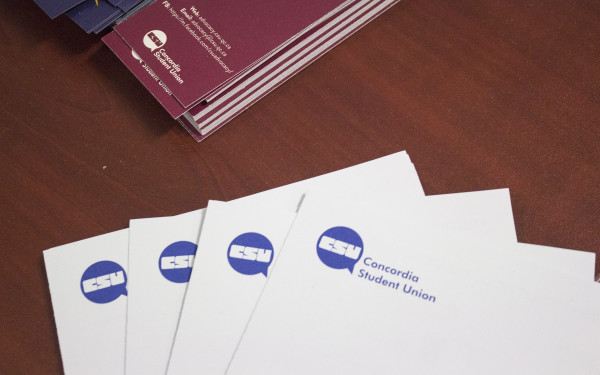FedUp Concordia calls for food sovereignty
Students will be able to vote for sustainable food measures at the upcoming CSU by-elections
Students at Concordia University will be able to vote on FedUp Concordia’s food sovereignty proposal in the upcoming Concordia Student Union (CSU) by-elections.
FedUp Concordia is a new group on campus formed by students frustrated with the quality and ethics of the food served at the university. Its goal is to move away from corporate food ownership at Concordia and switch to student-led initiatives.
The advocacy group had presented its referendum question on food sovereignty at a CSU council meeting in September. If the referendum question passes at the by-election, FedUp’s measures will be included in the CSU’s official Positions Book.
FedUp calls for three goals to be added.
The first goal calls for Concordia to create new regulations in accordance with the National Student Food Charter, which puts emphasis on values like social justice, sustainability and self-governance.
The second asks that Concordia supports and fosters more student-led food initiatives, like the Hive Café Solidarity Co-op or The People's Potato.
The third goal stresses the need for Concordia to end its contract with Aramark—a multinational food service provider—and to instead streamline access to local food services.
Aramark is notoriously known as the largest food provider in U.S. private and public prisons.
Eli Zeger, a volunteer with FedUp, said that one of its main objectives is to get Concordia to end its current contract with Aramark. The food advocacy group also does not want the university to sign future contracts with any other multinational corporation once its current contract expires in 2026.
Zeger added that these measures, if implemented, won’t just improve the sustainability and social impact of the food served at Concordia, but also the quality.
“Aramark has a monopoly over the food-related real estate at Concordia and they are depriving consumers of the right to shape the policy that affects them on a daily basis,” Zeger said.
According to Julie Fortier, a Concordia spokesperson, Aramark provides the food services in the residences and in six retail locations on Concordia campuses and does not have complete authority over the food served on campus.
As part of its contract, Aramark partners with other food companies to bring the services onto campus. This includes the Starbucks in the J.W. McConnell library building and companies that have shared investors, like BlackRock and The Vanguard Group.
BlackRock and The Vanguard Group are also shareholders in Lockheed Martin, one of the biggest U.S. arms manufacturing companies complicit in the genocide in Gaza.
Zeger and his colleagues point to several of Aramark’s business practices that don’t align with students’ visions for food at Concordia. This includes large-scale food waste—which FedUp claims is, in part, due to the multinational’s all-you-can-eat, buffet-style service—and its use of prison labour in the U.S.
The food advocacy group also takes issue with the company’s proven history of workers’ rights violations. According t/o the non-profit Good Jobs First’s violation tracker, Aramark has had to pay over US$9 million in wage and hour-violation-related fines since 2000.
“There have been reports of raw chicken being served in the dining halls, reports of people biting into bugs instead of fruit and, overall, the chances are you’re gonna get low-quality food for a high price,” Zeger said.
Those living in residence bear the brunt of these issues, since they have no choice but to pay $6,525 per year for their meal plan.
Olivia Ersil, a former Grey Nuns resident, recalls regularly eating unappetizing food.
“I remember one morning I went to scoop strawberries onto my plate and it was just mold,” Ersil said, “so that put me off strawberries for the foreseeable future.”
Without having other ways to cook her own food, Ersil says she was stuck eating in the cafeteria or having to spend even more money on eating out.
Winning the referendum may not only be beneficial to students who live in residence.
According to Danna Ballantyne, CSU external affairs and mobilization coordinator, it’s important to have FedUp’s referendum questions added to the Positions Book, as it would give the CSU the authority to face off with administration and launch campaigns to tackle these issues.
“Just having these positions is what keeps me safe in my everyday tasks,” Ballantyne said. “I'm only able to do this and represent the students because they have voted on that, because I have the right given to me by the student body.”
Ballantyne and the other CSU executives unanimously co-signed to endorse the proposal in September. Ballantyne said that most of the demands of the referendum question tie into other existing positions in their Position Book, such as concerns with food insecurity and financial difficulties. She further explained that this proposal could help unify the many food organizations at Concordia and create a united front.
“The university is constantly relying on the talking point that they don't hear complaints from the students and it lets them go on giving us unacceptable services. It is just so important that students let this be known because this is so real and it affects so many aspects of student life,” Ballantyne said. “I really hope students show up to vote, and literally just clicking that button will help us to get the ball rolling here.”
Undergraduate students will be able to vote for the FedUp referendum question in the upcoming CSU by-elections between Nov. 19 and Nov. 21. Students will receive an email with their online ballot information to vote remotely, or can cast their vote at in-person voting stations across campus.
A previous version of this article stated that Aramark’s contract gives them complete authority over the food served on campus. Aramark provides the food services in the residences and in six retail locations on Concordia campuses and does not have complete authority over food served on campus. The Link regrets this error.
This article originally appeared in Volume 45, Issue 6, published November 19, 2024.




_900_642_90_600_375_90_s_c1.jpg)


